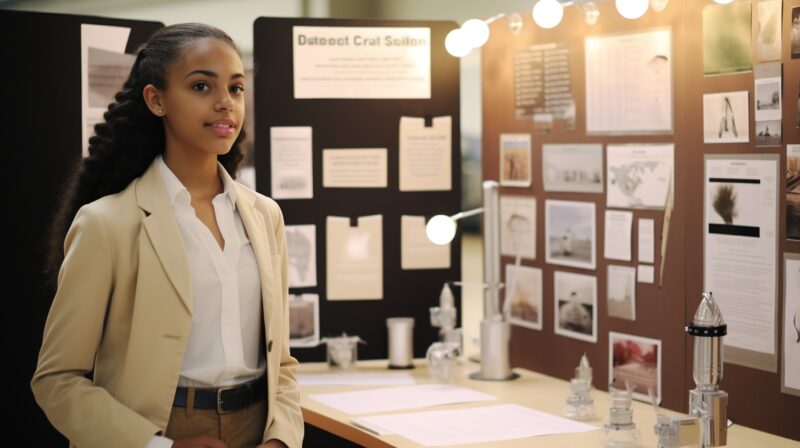Are you looking for some fun and interesting science fair ideas for your 8th-grade project? Science fairs are a great way to showcase your creativity, curiosity, and problem-solving skills.
You can choose a topic that interests you, design an experiment, and present your results to your classmates, teachers, and judges. But how do you find a good science fair idea?
There are so many possibilities, and you want to pick something that is original, feasible, and relevant. To help you out, we have compiled a list of 101 science fair ideas for 8th graders, divided into different categories.
Whether you are interested in biology, chemistry, physics, engineering, or something else, you are sure to find something that sparks your imagination.
Biology
- The Effect of Different Types of Fertilizers on Plant Growth
- Investigating Tooth Enamel Erosion: Effects of Various Liquids
- Natural Mosquito Repellents: Extracts vs. Mosquitoes
- The Photosynthesis Palette: Effects of Light Colors on Plants
- Purifying Water: Building a Simple Filtration System
- Nature’s Cleaners: Removing Stains with Natural Agents
- The Effect of Caffeine on Heart Rate
- The Effect of Music on Memory
- The Effect of Exercise on Lung Capacity
- The Effect of pH on Enzyme Activity
Chemistry

- The Chemistry of Making Ice Cream
- Make a Battery with Metal, Air, and Salt Water
- Make Your Own Shampoo
- The Reaction Between Baking Soda and Vinegar
- How an Instant Cold Pack Works
- Color Changing Iodine Clock Reaction
- The Effect of Temperature on Crystal Growth
- The Effect of pH on the Rate of Rusting
- The Effect of Soap on Surface Tension
- The Effect of Solutes on the Freezing Point of Water
Physics
- Drop an Egg to Prove the First Law of Motion
- Build a Rube Goldberg Machine
- Make a Simple Electric Motor
- Make a Simple Electromagnet
- Make a Simple Speaker
- Make a Simple Telescope
- Make a Simple Periscope
- Make a Simple Kaleidoscope
- The Effect of Air Resistance on Falling Objects
- The Effect of Friction on Sliding Objects
Engineering
- Develop a Robotic Hand
- Construct a Wind Turbine
- Create a Solar Oven
- Build a Water Filter
- Design a Bridge
- Engineer a Catapult
- Design a Parachute
- Construct a Roller Coaster
- Create a Paper Airplane
- Build a Marble Run
Earth and Environmental Science Experiments
- Monitor Algae Growth
- Assess Soil Moisture Levels
- Test Soil pH
- Evaluate Air Quality
- Analyze Water Quality
- Investigate the Greenhouse Effect
- Examine the Impact of Acid Rain
- Study the Effects of Global Warming
- Observe the Consequences of Erosion
- Explore the Benefits of Composting
Astronomy Models
- Simulate the Solar System
- Demonstrate the Moon’s Phases
- Illustrate Solar and Lunar Eclipses
- Represent Earth’s Seasons
- Model Oceanic Tides
- Depict Planetary Orbits
- Show Earth’s Rotation and Revolution
- Construct Constellation Models
- Model a Star’s Life Cycle
- Create a Crater Formation Model
Psychology Experiments
- Conduct the Stroop Effect Test
- Investigate the False Memory Effect
- Explore the Serial Position Effect
- Study the Anchoring Effect
- Examine the Halo Effect
- Observe the Bystander Effect
- Test the Placebo Effect
- Analyze the Priming Effect
- Research the Dunning-Kruger Effect
- Investigate the Pygmalion Effect
Sociology Studies

- Examine Gender’s Impact on Academic Performance
- Study Age’s Influence on Generosity
- Explore Cultural Effects on Food Preferences
- Assess Social Media’s Impact on Self-Esteem
- Investigate Music’s Effect on Mood
- Examine Video Games’ Influence on Aggression
- Analyze Peer Pressure’s Role in Decision-Making
- Study Group Size’s Effect on Cooperation
- Explore Diversity’s Impact on Creativity
- Investigate Competition’s Role in Motivation
Video Games
- Impact of Video Games on Brain Activity
- Effect of Video Games on Mood
- Influence of Video Games on Vision
- Video Games and Learning Outcomes
- Video Games and Social Skills Development
- Creativity Enhancement through Video Games
- Physical Health Effects of Video Gaming
- Video Games and Environmental Awareness
- Ethical Reasoning Influenced by Video Games
- Cultural Competence through Video Gaming
Computer Science
- Teach a computer to play tic-tac-toe
- Use Artificial Intelligence to classify emotions
- Build an App
- Identify objects with Machine Learning
- Make a Motion Sensor Alarm
- Design your own video game
- Code a calculator
- Make an encryption program
- Create a chatbot
- Program a music synthesizer
- Develop a web crawler
Making Your Science Fair Project Shine
If you’re a fan of volcano projects then, starting a science fair project will be an exciting journey into the world of science and new ideas. But with so many great projects out there, it can be tough to make yours stand out.
To grab attention and make people remember your project, you need to be creative. This means coming up with fresh and different ideas that make your project unique.
Think outside the box, question the usual ways of thinking, and add your own original twist to your work. While it’s great to be imaginative, remember to base your ideas on solid science and do thorough research.
This balance between creativity and science is key to a successful project.
Tip: Another successful project idea for the next Science Fair can be food molding.
Thorough Research
Doing thorough research is really important for your science fair project. Look into your topic, learning all the small details and important points.
Make sure to use information from trustworthy sources, do careful experiments, and look at your results carefully and fairly. Your research is the strong base that makes your project believable and convincing.
Having a good plan is like having a map for your project. Write down each step of your research, how you’ll do your experiments, and how you’ll look at your data.
Think about what might go wrong and have backup plans ready. A clear plan helps you work better and keeps you organized and confident.
Effective Communication: The Art of Storytelling
FAQ
Can I integrate technology like AR or VR into my science fair project?
Absolutely! Incorporating augmented reality (AR) or virtual reality (VR) can make your project more interactive and engaging. For instance, you could use VR to simulate an environment related to your project, or AR to provide a more immersive explanation of your findings.
How can I involve the audience in my science fair presentation?
Interactive elements can greatly enhance audience engagement. Consider incorporating simple experiments or demonstrations in which the audience can participate, or interactive quizzes related to your project. This not only makes your presentation more memorable but also helps in explaining complex concepts.
Is it beneficial to collaborate with local scientists or experts in my project?
Collaborating with experts can add depth and credibility to your project. They can provide valuable insights, resources, and guidance. Just ensure that your project remains primarily your own work, and give appropriate credit for any assistance received.
How can I use social media to enhance my science fair project?
Social media can be a powerful tool to document and share your project’s progress. You can create posts or videos explaining your experiments, share interesting findings, or even conduct online surveys. This not only broadens your project’s reach but also helps in receiving feedback and ideas.
What role can storytelling play in my science fair project?
Storytelling can make your project more relatable and engaging. You can weave a narrative around your project, explaining the problem you’re addressing, your journey of discovery, and the implications of your findings. This approach can make complex scientific concepts more understandable and interesting.
How can I ensure my project is environmentally sustainable?
Consider using recycled or eco-friendly materials and focus on sustainability in your project design. If your project involves experiments, ensure they are environmentally safe. Projects that address environmental issues or promote sustainability often stand out for their relevance and ethical considerations.
Final Words
In summary, the 101 science fair ideas for 8th graders span a wide array of subjects, from biology to computer science, offering students a chance to explore their interests and develop critical thinking and problem-solving skills. These projects are more than just assignments; they are opportunities for young learners to engage in scientific inquiry, express creativity, and build confidence.
The key to a successful science fair project lies in choosing a topic that excites the student, conducting thorough research, and presenting the findings effectively. This experience not only enriches their knowledge but also fosters a lifelong passion for science and discovery.

